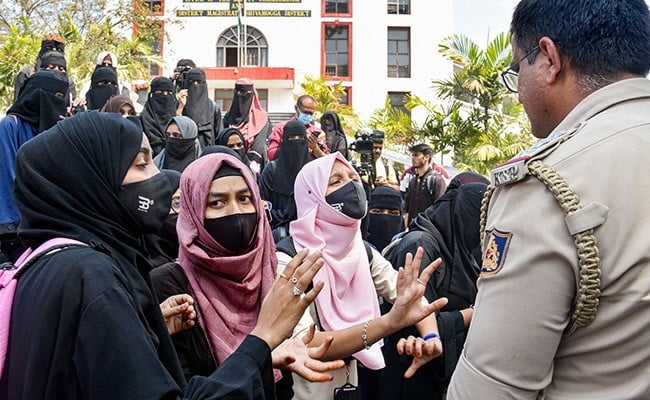Karnataka Hijab Ban: Niba Naaz, a student who was not among the five who originally petitioned against the hijab ban, has challenged the order in the Supreme Court.

The hijab is not an essential religious practice, the Karnataka High Court said in backing a ban on hijab in classrooms on Tuesday, weeks after violent protests in many parts of the state against the restriction.
The order was challenged in the High Court by Niba Naaz, a student who was not among the five who initially protested the hijab ban. “We reasonably believe that the wearing of the hijab by Muslim women is not part of the essential religious practice of the Islamic faith,” the Karnataka Supreme Court ruled, refusing to overturn the state government’s ban and rejecting the students’ requests. In a decree on February 5, the government of Karnataka banned in schools and colleges clothing “that disturbs equality, integrity and public order”.
The High Court upheld that order, saying a school uniform was a reasonable restriction that pupils could not object to. Schools have legitimate reasons to impose dress codes that ban the hijab to avoid divisions on religious and other grounds, according to the ruling. “The purpose of the ordinance is to create a ‘safe space’…and the ideals of egalitarianism should be readily apparent to all students,” he said. “The Constitution gives us the right to profess our religion.
We are shocked, we expected so much. We will not go to university without the hijab,” the girls told reporters, promising to appeal the verdict.
The students had told the court that wearing headscarves is a fundamental right guaranteed by the Indian Constitution and a essential practice. Anticipating tensions, the government had banned large gatherings in towns such as Bengaluru, Mangaluru and Shivamogga for a week. Schools and colleges are closed today in Udupi, where protests began in December.
The Upper Karnataka’s court temporarily banned religious attire, including hijabs and saffron shawls, last month when the controversy sparked protests and clashes between various student groups.
The massive hijab controversy erupted when students at a school in Udupi claimed they were banned from entering class wearing headscarves for the first time in years. As the restrictions spread to more campuses, there was an escalation, with students wearing saffron launching rival protests.
The ruling BJP has denied allegations of targeting Muslim students and attempting to drive a wedge between communities. Party leaders said no religious symbols should be allowed at study sites. “I welcome the court’s decision. I call on everyone that the state and the country must move forward, everyone must keep the peace by accepting the Supreme Court order.
The core work of students is learning. So they should put all that aside, study and be united,” Union Minister Pralhad Joshi said in Delhi.


